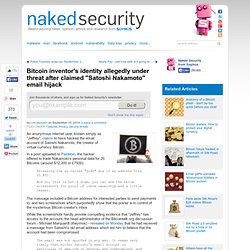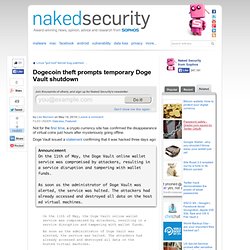

Bitcoin inventor’s identity allegedly under threat after claimed “Satoshi Nakamoto” email hijack. An anonymous internet user, known simply as "Jeffrey", claims to have hacked the email account of Satoshi Nakamoto, the creator of virtual currency Bitcoin.

In a post uploaded to Pastebin, the hacker offered to trade Nakamoto’s personal data for 25 Bitcoins (around $12,000 or £7500): Releasing the so called "gods" dox if my address hits 25 BTC.And no, this is not a scam, you can see the below screenshots for proof of inbox ownership and a little teaser. The message included a Bitcoin address for interested parties to send payments to, and two screenshots which purportedly show that the poster is in control of the mysterious Bitcoin creator's inbox.
While the screenshots hardly provide compelling evidence that "Jeffrey" has access to the account, the head administrator of the Bitcointalk.org discussion forum - Michael Marquardt (theymos) - revealed on Monday that he had received a message from Satoshi’s old email address which led him to believe that the account had been compromised: Japanese newspaper makes bold claim about Mt Gox’s 2014 Bitcoin loss. If you're a Bitcoin user, you'll know that 2014 was a bit of an annus horribilis for the "freedom currency.

" Bitcoins are effectively cryptographic puzzles that are claimed by the first person to solve each one, and thereafter traded at a value agreed between buyer and seller. That makes them into a cash currency, more or less, but without any central backing or, for that matter, regulation. There's a good side to that: no government body can summarily devalue or disown your Bitcoin stash. That can, and has, happened with centrally managed currencies, as for example in Zimbabwe in 2009. Hyperinflation over a number of years rendered the Zimbabwe dollar so worthless that the government eventually disowned it altogether, leaving the economy to operate on other countries' money, notably the US dollar and the South African Rand.
Effectively, the exchange rate against all other currencies officially became zero, so that any Zimdollars you had were quite literally worthless. Bitcoin - Pas si anonyme que ça sur le réseau ? Bitcoin – Pas si anonyme que ça sur le réseau ?

Tentez votre chance pour gagner un Oculus Rift et des montres connectées Pebble en cliquant ici ! Des chercheurs de l'Université du Luxembourg viennent de publier une étude (PDF) qui explique une série d'attaques permettant d'associer le hash utilisé lors d'une transaction Bitcoin avec l'adresse IP réelle de l'utilisateur. Cela fonctionne même si l'utilisateur est derrière un routeur qui fait du NAT (et qui partage donc une seule IP publique avec de nombreuses personnespersonnes) et il est même possible de déjouer l'utilisation de TOR pour révéler l'adresse IP. Bon, c'est assez technique, mais en gros, quand votre client Bitcoin se connecte au réseau, il établit au minimum 8 connexions au réseau Bitcoin. Grâce à leur méthode, les chercheurs peuvent déterminer avec un fort taux de certitude quelles sont ces 8 connexions et relier les transactions sortantes de ces serveurs avec votre adresse IP simplement en analysant l'activité sur le réseau.
Dogecoin theft prompts temporary Doge Vault shutdown. Not for the first time, a crypto currency site has confirmed the disappearance of virtual coins just hours after mysteriously going offline.

Doge Vault issued a statement confirming that it was hacked three days ago: On the 11th of May, the Doge Vault online wallet service was compromised by attackers, resulting in a service disruption and tampering with wallet funds.As soon as the administrator of Doge Vault was alerted, the service was halted. The attackers had already accessed and destroyed all data on the hosted virtual machines. The administrator is currently assessing the attack and miners and other accumulators of Dogecoins will be hoping that the site's backup strategy has been sufficient to protect the value of their wallets: We are currently in the process of identifying the extent of the attack and potential impact on user's funds.
If fraud or theft results in you or your investment losing bitcoins, you may have limited recovery options. Faillite de MtGox, plateforme japonaise du Bitcoin. LE MONDE | • Mis à jour le | Par Jérôme Marin Quatre ans après sa création, le bitcoin fait face à sa plus grave crise.

Vendredi 28 février, MtGox, l'une des principales plates-formes d'échange de la monnaie virtuelle, s'est en effet placée sous la protection de la loi sur les faillites au Japon, confirmant les craintes de ses clients. Ces derniers, dont le nombre est estimé à 500 000, n'ont désormais que très peu de chance de récupérer leurs investissements. L'ampleur de leurs pertes se chiffre en centaines de millions de dollars. La chute de MtGox a été provoquée par un vaste piratage informatique. « Nous avons perdu beaucoup de bitcoins à cause des faiblesses du système », a reconnu son PDG, Mark Karpèles, un expatrié français installé au Japon. 850 000 bitcoins, soit 7 % du montant total en circulation dans le monde, ont été dérobés lors d'une attaque lancée début février.